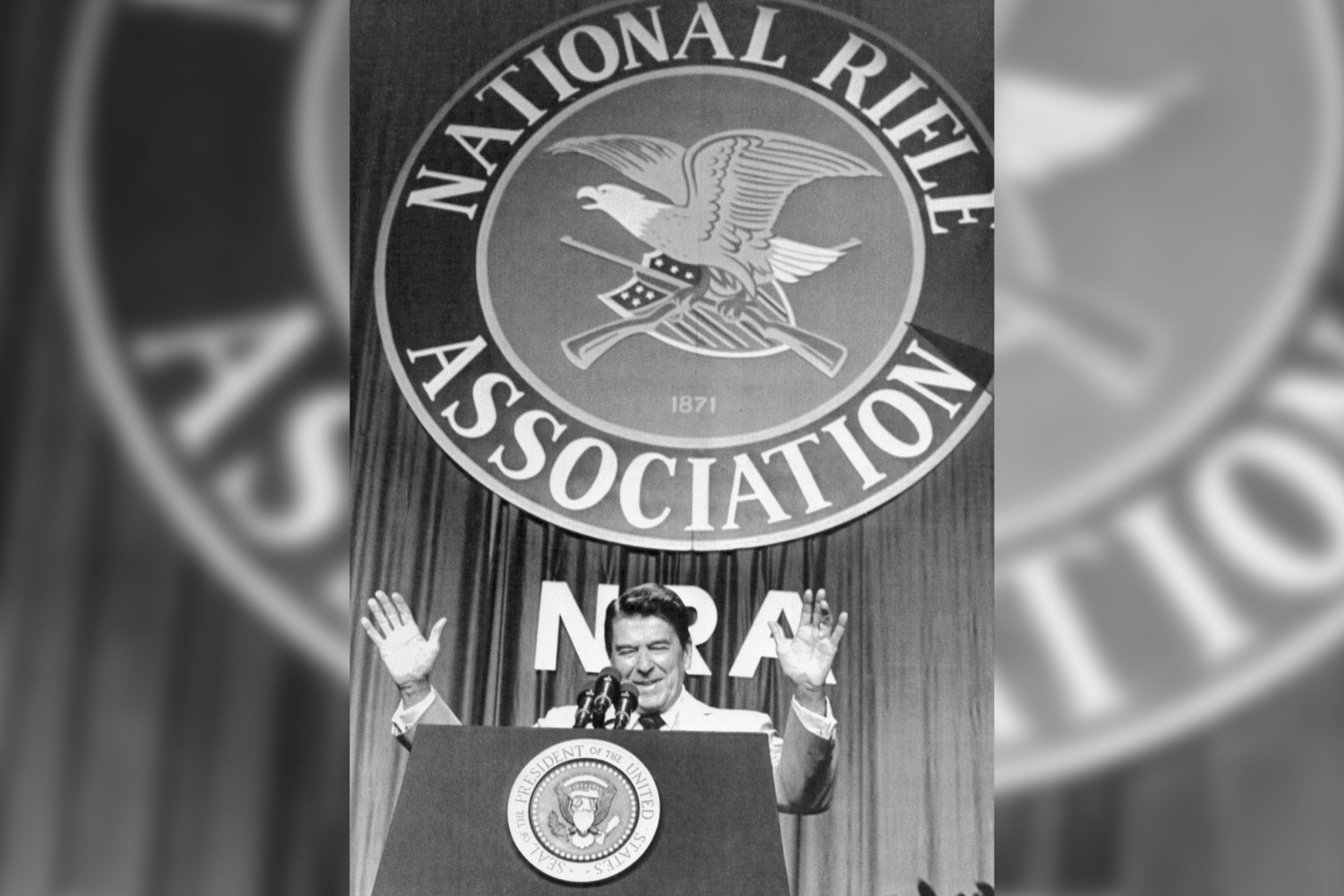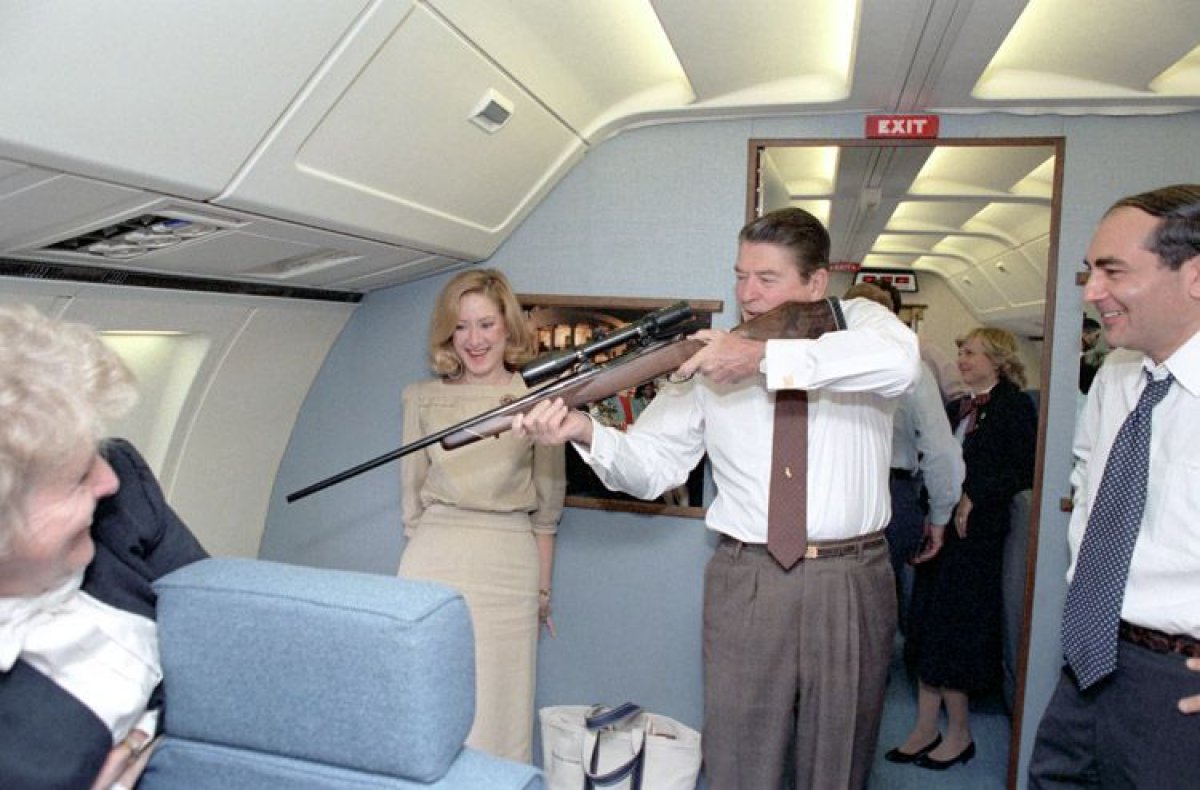
Ronald Reagan was the last sitting president to speak at the National Rifle Association's annual meeting, addressing its 112th gathering in May 1983, during the third year of his first term—and a bit more than two years after he was shot in an assassination attempt. The next to do so will be President Donald Trump, who will appear at the NRA-ILA Leadership Forum in Atlanta on Friday afternoon. It will be his 99th day in office, and just a week shy of the 34-year anniversary of Reagan's speech.
Related: Donald Trump and the NRA endorse each other
"The fact that he decided to address the NRA convention is, I think, very significant and indicates that he still considers the NRA a very important part of his base," says Dennis Henigan, author of "Guns Don't Kill People, People Kill People" and Other Myths About Guns and Gun Control and a former vice president of the Brady Campaign to Prevent Gun Violence. "I have no doubt that pro-gun activists are among the mostrabid Trump supporters, and he knows that and his people know that."
In election years, it's typical for top GOP presidential candidates to address the meeting, but it's rare for some presidents—even Republicans—to do so. Neither Bush spoke to the NRA during their presidencies, and the elder Bush even cut ties to the NRA after leaving the White House, following a fundraising letter in which the group's leader, Wayne LaPierre, labeled federal agents as "jackbooted thugs" who robbed citizens of their constitutional rights. The closest a recent president has come to addressing the meeting was when the younger Bush sent Vice President Dick Cheney to do so in 2004, as he sought re-election.
Not surprisingly, given their party's stance on gun control, Democratic presidents have been the subject of NRA attacks, so Bill Clinton and Barack Obama never went near the annual gun convention.
The NRA long has been a political force that advocates for or against lawmakers, depending on whether they support loosening gun restrictions. The annual meeting is a must-attend for politicians who want the s0-called gun vote. More than 80,000 Americans and 800 exhibitors are expected to be at the four-day 146th NRA Annual Meetings and Exhibits this year, according to the event's website.
Ahead of Trump's speech, Richard Feldman, author of Ricochet: Confessions of a Gun Lobbyist, tellsNewsweek he expects the president "to have as adoring a crowd as he'll ever have at this function, so he'll be a happy camper." But, he adds, "I don't think what he says on guns is going to be all that interesting. It's kind of predictable."
Many rounds of applause should indeed be expected, as the NRA went all in on getting Trump elected. It endorsed him very early—nearly six months ahead of Election Day, compared with a month before for the 2008 and 2012 GOP nominees, John McCain and Mitt Romney. In addition, the NRA gave his campaign millions of dollars as its avid supporters cheered on the candidate when he vowed to abolish gun-free zones at schools and on military bases, expand gun rights for law-abiding citizens and even said he could shoot somebody on Manhattan's Fifth Avenue without losing supporters.
Much of the rhetoric has changed since Reagan's time when it comes to guns in America, as should be evident when contrasting his speech with what Trump will likely say Friday.
Reagan and Gun Laws
As Reagan was preparing for his re-election bid in 1984, some in his administration thought it would be wise to shore up his support of gun owners, Feldman says. But in the wake of the assassination attempt, there was some fear within the NRA that he might "go soft" on the gun rights issue.
That concern wasn't without foundation. During the Reagan administration, the Department of the Interior in the early 1980s restricted the carrying of loaded guns in national parks and wildlife refuges. About 25 years later, President Barack Obama during his first month in office overturned that ban.
The enactment of federal background check legislation and the ban on assault weapons didn't come until 1993 and 1994, respectively, during Bill Clinton's presidency. Reagan ultimately endorsed the Brady Bill in the early 1990s (it was, of course, named after his press secretary, James Brady, who was wounded during the 1981 assassination attempt), which was a significant step because it gave Republicans in Congress political cover in supporting the gun measure.
What Reagan Said in 1983
Reagan saluted the NRA during his 33-minute speech at the Annual Members Banquet in Phoenix—reminding the audience of his membership—and comforted the gun rights advocates by vowing to "never disarm any American who seeks to protect his or her family from fear and harm." He also stressed the importance of constitutional freedoms as "every American's birthright" and called for harsher punishments for career criminals. He touched upon other long-standing NRA themes, such as the view that gun control is the first step toward the total confiscation of all law-abiding citizens' guns, and that those who want to inflict harm on others aren't fazed by stricter gun laws—a nod to the assassination attempt in March 1981.
But much of his address had nothing to do with guns, nor did it emphasize the idea of exercising the right to carry firearms outside of the home. Instead, with the Cold War as his backdrop, he discussed, among other things, the withdrawal of Israeli forces from Lebanon and the Salvadoran Civil War.
Related: Guns in America: Majority oppose carrying in public
In perhaps what was a sign of the times, he also never mentioned the Second Amendment by name. In avoiding such topics, his speech reflected a somewhat different era than what we see with today's ongoing and ever more partisan gun debate.
"It struck me as a significant indication of how the gun issue has changed since 1983 and how the issue is now so focused on the carrying of guns in public places," Henigan tells Newsweek. He adds that during the 1980s, "it was pretty much of a consensus view that there ought to be greater restrictions on the carrying of guns in public than possessing guns in the home."
Back then, Americans owned guns largely for hunting and fishing. Reagan even devoted nearly five minutes of his address to touching upon conservation efforts among American sportsmen. Six months later, a photograph surfaced of Reagan aiming a rifle at a window while flying aboard Air Force One during a trip to California.

Reagan delivered his speech just a few years before the NRA embarked on a state-by-state campaign, beginning with Florida, to loosen concealed gun laws. Now, all 50 states and Washington, D.C., allow concealed carry in some form. Thirty-eight states generally require a state-issued permit to carry concealed weapons in public; the other 12 don't require a permit. Republican legislators in some of the 38 states are pushing forward with measures known as constitutional carry or permitless carry.
Where guns may be carried in public wasn't such a hot issue in 1983, but it is now. We've seen lots of action in the months since Trump's inauguration, with the passage of permitless carry measures in statehouses across the country and the push at the federal level for national concealed-carry reciprocity (requiring states to recognize one another's gun permits), which Trump has publicly supported. "The thing that's missing [in Reagan's address] that I think you're probably going to see in Trump's speech is this discussion of how important it is that law-abiding citizens be able to carry guns in the public places," Henigan says.
At one point, Reagan advocated for something he knew those in the audience weren't likely to support: outlawing armor-piercing bullets. Of these bullets, he said, "Perhaps there'll be some disagreement in this, but I have to say it.... These are designed to truly be a threat to law enforcement officers who, so many times, have to depend on bulletproof vests." Three years later, he signed legislation prohibiting those kinds of bullets.
"Make no mistake: Ronald Reagan's speech was pandering to the interests of the NRA as the corporate gun lobby, but it demonstrated a level of thoughtfulness that we don't have any reason to expect from Donald Trump," says Dan Gross, president of the Brady Campaign. "For Donald Trump, it is very clearly about paying the gun lobby back for the big investment that they made in his campaign."
So What Should We Expect From Trump?
This isn't even the first time Trump will be addressing the NRA. He spoke at its annual forum as a private citizen in 2015, shortly before he declared his intention to run for the presidency, and again in 2016, after he had officially earned the NRA's endorsement.
The NRA is preparing for Trump's speech with a short web video titled "It's Morning in America, Once Again," which plays off of Reagan's 1984 re-election commercial that promised a stronger country. The video highlights parts of Reagan's speech, as well as Trump's 2016 address to the NRA. Meanwhile, advocates on the other side are planning a so-called die-in at a park near the Georgia World Congress Center where Trump will speak, to represent the Americans who are fatally shot each day. And Everytown for Gun Safety, along with Georgia lawmakers and local advocates, will hold a street protest on Saturday morning.
Erich Pratt, executive director of Gun Owners of America, says Trump likely will start his address by praising the Second Amendment and the gun-owning community, and then discuss different gun-control measures "that make us less safe" and restrictions that "need to be repealed."
Others predict Trump will highlight national concealed-carry reciprocity and the use of guns for self-defense, and for defense against terrorism. Gross says he expects "a lot of boisterous, inflammatory rhetoric that is almost in its entirety likely to be misrepresenting of the truth."
As a Manhattanite, Trump isn't exactly from the NRA milieu, and he wasn't always an avid supporter of gun rights. (Before he was a presidential contender, he called out Republicans who "walk the NRA line" and "refuse even limited restrictions" on firearms.) "He's going to be reaching for ways to establish his bona fides with this group as someone who appreciates the societal value of guns personally," Henigan says. On the campaign trail, for example, we heard Trump continually tout his two adult sons as lifetime members who are "serious NRA."
Still, since his inauguration, Trump already has taken significant steps to roll back several Obama-era gun restrictions and appeal to gun rights advocates, including the repeal of a rule that prevented Americans with certain mental health conditions from buying guns. Just last week, Trump replaced the Obama-era surgeon general, Vivek Murthy, who had declared guns to be a health issue. And on his first day in office, Trump's interior secretary, Ryan Zinke, ended a short-lived Obama ban on bullets and fish tackle that contain lead. (Zinke is also slotted to speak at the NRA forum.)
Pratt adds, "Let's face it: His audience is going to be a pro-gun audience, so he's going to talk about the issues that are going to make them happy."
Uncommon Knowledge
Newsweek is committed to challenging conventional wisdom and finding connections in the search for common ground.
Newsweek is committed to challenging conventional wisdom and finding connections in the search for common ground.
About the writer
Michele Gorman is a Newsweek political reporter, with a focus on gun policy. She previously worked at msnbc.com, where she ... Read more
To read how Newsweek uses AI as a newsroom tool, Click here.








